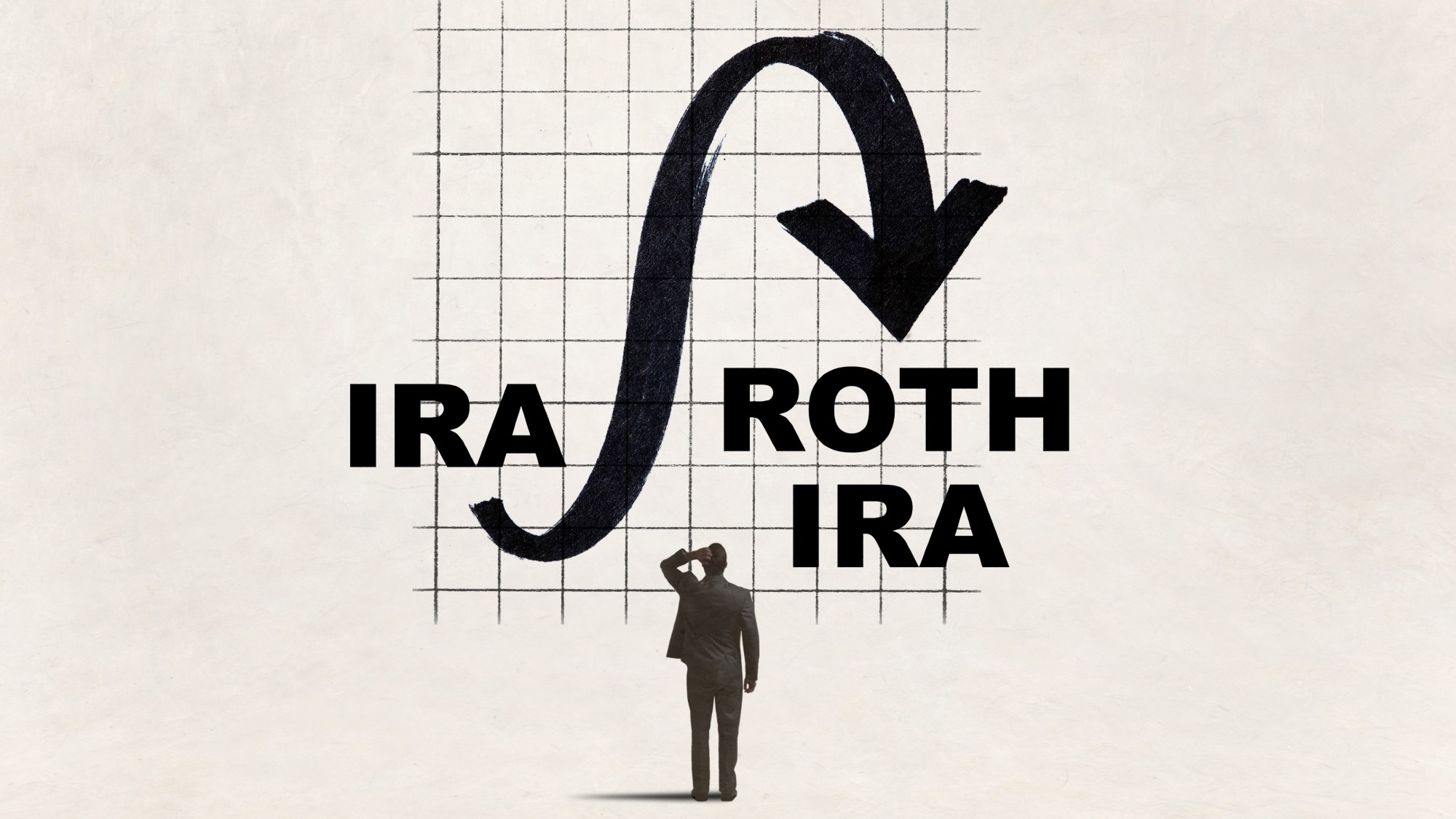The pros and cons of mortgages
Increasing numbers of borrowers are taking out long-term mortgages; many could still be repaying them in retirement

A free daily email with the biggest news stories of the day – and the best features from TheWeek.com
You are now subscribed
Your newsletter sign-up was successful
Increasing numbers of people are opting for longer-term mortgages, raising the risk of having to pay off the debt into retirement.
There has been a "surge in mortgage terms beyond state pension age", said BBC News, as higher home loan pricing is pushing people to "choose an extended repayment period to control costs".
A longer term reduces the monthly repayments on a mortgage but means paying more overall.
The Week
Escape your echo chamber. Get the facts behind the news, plus analysis from multiple perspectives.

Sign up for The Week's Free Newsletters
From our morning news briefing to a weekly Good News Newsletter, get the best of The Week delivered directly to your inbox.
From our morning news briefing to a weekly Good News Newsletter, get the best of The Week delivered directly to your inbox.
This means mortgage borrowers are taking terms of 35, 40 or even 45 years, "stretching into retirement and beyond", said the Daily Express, and potentially causing "severe financial problems further down the line" when people need to fund their retirement.
Former pensions minister Steve Webb, now a partner for financial consultancy LCP, which conducted the research, said younger buyers are "gambling with their retirement prospects by taking on ultra-long mortgages".
Here are the pros and cons of mortgages, particularly if you may still be making repayments in retirement.
Pro: purchase your own home
A mortgage helps you get on the property ladder "without needing to save up the full purchase price up front", explained MoneySuperMarket.
A free daily email with the biggest news stories of the day – and the best features from TheWeek.com
Borrowers pay a deposit and then make repayments every month. These repayments are based on the interest rate and deal term.
Con: major financial commitment
Buying a home is "the biggest financial commitment" most people have in their lives, said the HomeOwners Alliance. It is not something you can "easily escape from".
In addition, your home may be repossessed by the lender if you cannot afford to repay your mortgage, if, for example, you lose your job.
Pro: build equity
You will be building equity in the property the more you pay off the mortgage, said Hopkins Homes, "which can increase your net worth over time".
Equity can be built faster if overpayments are made through a lump sum or higher monthly payments. Each provider will have rules concerning how much can be overpaid.
Con: risk of negative equity
A property is classed as being in negative equity "if it's worth less than the mortgage you took out on it", explained MoneyHelper.
It is "normally caused by falling property prices", added the financial website, and may affect those with interest-only mortgages where the actual debt isn't being repaid or if you have taken out a home loan with a small deposit and the value falls below the amount of the mortgage loan.
Negative equity becomes a problem if you want to sell, said Reallymoving, as you would "need to pay back your mortgage lender", but there may not be enough money raised from the transaction to settle your debt.
Pro: cheaper than renting
Buying a property is cheaper than renting "despite higher mortgage rates", said ThisIsMoney.
Research by estate agent Hamptons for the financial website found that based on a mortgage rate of 4.38% at 90% loan-to-value, a £200,000 mortgage over 30 years would cost £999 a month for the first five years.
In contrast, average rents have hit a "new record" of £1,280 a month outside London – based on Rightmove figures.
Con: extra costs
When it comes to mortgage borrowing, "it's not just the interest rate" you need to consider, said MoneySuperMarket.
There are other costs to save for such as a deposit, arrangement and valuation fees and conveyancing costs, as well as early repayment charges if you want to pay off the home loan before the deal period ends.
You may have to pay stamp duty, in England and Northern Ireland, although first-time buyers are currently exempt on the first £425,000 of the property tax on purchase worth up to £625,000.
As a homeowner, you are also responsible for "insurance, maintenance and improvements", added the HomeOwners Alliance so "you can't just phone up the landlord asking them to fix the boiler."
Pro: flexibility
From fixed rates over two years, five years or longer, and trackers, mortgages have various terms and repayment options to suit different budgets and goals.
There is likely to be a mortgage deal "that's ideal for your circumstances", said WhatHouse?
Depending on the rate, added the financial website, spreading the payments on a monthly basis "could well be much lower than the rent you would pay in your area".
Con: risk of borrowing into retirement
Taking out a longer-term mortgage can be "more attractive when interest rates are high", said Sky News, as monthly repayments are lower. Many lenders let borrowers take a mortgage over a term of up to 40 years.
A 25-year £200,000 mortgage on a fixed rate of 5% would cost £1,169 per month but that drops to £964 over a 40-year period.
But people taking out longer loans could still end up with mortgage debt in retirement, said MoneyWeek, putting them "at risk of poverty in old age", especially if they find it harder to work as they get older, but still need to repay the loan.
Steve Webb told the publication if people still have a mortgage as they retire, their "instinct will be simply to tip out their (already inadequate) pension pots to clear the mortgage balance".
It is possible borrowers will find the mortgage more manageable before they retire, the financial website added, as "their income may rise, they may move house, and they could swap their long-term mortgage for a shorter one".
Marc Shoffman is an NCTJ-qualified award-winning freelance journalist, specialising in business, property and personal finance. He has a BA in multimedia journalism from Bournemouth University and a master’s in financial journalism from City University, London. His career began at FT Business trade publication Financial Adviser, during the 2008 banking crash. In 2013, he moved to MailOnline’s personal finance section This is Money, where he covered topics ranging from mortgages and pensions to investments and even a bit of Bitcoin. Since going freelance in 2016, his work has appeared in MoneyWeek, The Times, The Mail on Sunday and on the i news site.
-
 The Olympic timekeepers keeping the Games on track
The Olympic timekeepers keeping the Games on trackUnder the Radar Swiss watchmaking giant Omega has been at the finish line of every Olympic Games for nearly 100 years
-
 Will increasing tensions with Iran boil over into war?
Will increasing tensions with Iran boil over into war?Today’s Big Question President Donald Trump has recently been threatening the country
-
 Corruption: The spy sheikh and the president
Corruption: The spy sheikh and the presidentFeature Trump is at the center of another scandal
-
 The pros and cons of tapping your 401(k) for a down payment
The pros and cons of tapping your 401(k) for a down paymentpros and cons Does it make good financial sense to raid your retirement for a home purchase?
-
 Six ways to boost your finances in 2026
Six ways to boost your finances in 2026The Explainer It’s not too late to make a new year’s resolution to finally get organised money-wise
-
 Could a part-and-part mortgage help you on to the property ladder?
Could a part-and-part mortgage help you on to the property ladder?The Explainer Combining repayment and interest-only mortgages could become more popular as part of a push towards more flexible lending
-
 Why it’s important to shop around for a mortgage and what to look for
Why it’s important to shop around for a mortgage and what to look forThe Explainer You can save big by comparing different mortgage offers
-
 How to save more for retirement next year
How to save more for retirement next yearthe explainer Secure yourself a suitable nest egg
-
 What are the pros and cons of a Roth conversion for retirement?
What are the pros and cons of a Roth conversion for retirement?Pros and Cons By converting a traditional IRA to a Roth IRA, retirees can skip paying taxes on their withdrawals
-
 What’s the best way to use your year-end bonus?
What’s the best way to use your year-end bonus?the explainer Pay down debt, add it to an emergency fund or put it toward retirement
-
 What are portable mortgages and how do they work?
What are portable mortgages and how do they work?the explainer Homeowners can transfer their old rates to a new property in the UK and Canada. The Trump administration is considering making it possible in the US.